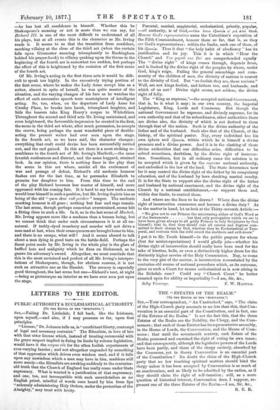THE "ESTATES OF THE REALM."
rTO THE EDITOR OF THE "SPECTATOR."] SM,—Your correspondent, "An Unattached," says, "The claim of the High-Church party amounts to no less than this, that Con- vocation is an essential part of the Constitution, and in fact, one of the Estates of the Realm." Is not the fact this, that the three Estates of the Realm are the Nobility, the Clergy, and the Com- moners; that each of these Estates has its representative assembly, in the House of Lords, the Convocation, and the House of Com- mons; that until the seventeenth century, each Estate of the Realm possessed and exercised the right of voting its own taxes ; and that consequently, although the legislative powers of the Lords have been partly, and those of the clergy entirely, absorbed by the Commons, yet in theory Convocation is an essential part of the Constitution ? No doubt the claim of the High-Church party that no law touching spiritual matters should bind the clergy unless it has been accepted by Convocation is as much of an anachronism, and as likely to be admitted by the nation, as if they should claim the right of self-taxation ; still, as a mere question of historical interest, Convocation does, I suppose, re- present one of the three Estates of the Realm.—I am, Sir, &c.,
R. E. B.


































 Previous page
Previous page